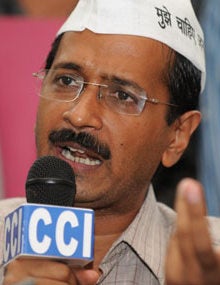Corruption gossip floods India but change will be slow

India loves tamashas and Delhi loves political gossip, and both forms of entertainment have been in full supply over the past couple of weeks when the reputations of top politicians and others have been publicly attacked, mostly by Arvind Kejriwal, a politically ambitious anti-corruption campaigner. This flood of allegations – and the prospect of more to come - has widespread ramifications because it seems to be open season to reveal the suspected wrongdoings of the rich, famous, and powerful, using right to information laws.
The thread running through many of the alleged exposure involves powerful people acquiring land far below market value, often for government projects, and then reaping large profits when the land is sold to private developers that are often involved in corrupt irrigation, real estate and other deals
The main target has been Robert Vadra, a brass ornaments trader who 15 years ago became the son-in-law of Sonia Gandhi, leader of the Congress Party and India’s governing coalition. Vadra has accumulated surprising wealth through land deals in the state of Haryana and elsewhere, often with DLF, a leading well-connected real estate developer.
Other targets include Salman Khurshid, the Law Minister, whose usually urbane style collapsed under pressure when his wife’s charity for the disabled was accused, following a sting operation mounted by an India Today group television channel, of misusing Rs1.31 crore ($250,000, £150,000) funds. Sharad Pawar, a veteran Maharashtra-based politician and government minister who is famed for using his wealth as a big investor in real estate and other business projects, has been accused along with his daughter and other relations, who are also in politics, of various land and irrigation scandals. Accusations of fraud and crony links (some involving Pawar) have also been made against companies associated with Nitin Gadkari, the president of the Bharatiya Janata Party (BJP), who comes from Maharashtra.
Even Rahul Gandhi, Sonia’s son and heir apparent, was dragged into one of his brother-in-law Vadra’s land deals, where it was alleged he too had benefited from under-valued land.
The media has not escaped. Naveen Jindal, an MP and leading steel industry businessman, who has been accused of corruption over coal mining licences, staged a sting on an extortion-seeking television channel, Zee TV. The channel was allegedly offering to abandon a damaging news report if Jindal bought Rs100 crore (approx $20m, £11.5m) of advertisements – a widely practised form of corruption in the Indian media.
The media has leaped with glee on these stories, many of which it has already known about, or suspected, but never had the nerve to publicise - though the Vadra allegations did appear once in The Economic Times in March last year. India’s Outlook news weekly magazine ran the Vadra story a week after The Economic Times and mentioned a point that has become headlines in the past few days – that leaders of the Congress Party and the BJP seem to have an understanding that they will not attack the personal affairs, including corruption, of each others’ leaders and their families.
Such a pact not to attack each other has now been confirmed by Digvijay Singh, a senior Congress Party general secretary, who said on India’s CNN-IBN tv channel that Congress had evidence of corruption against Vajpayee, and against his L.K.Advani who was then Home Minister, but would “never use this”.
One significant aspect of the Kejriwal revelations is that he has been prepared to challenge the Gandhi dynasty in public, albeit mainly with an attack on a not-very-respected son-in-law. Since she entered politics at the end of the 1990s, Sonia Gandhi has drawn a much tighter cloak of secrecy and silence around her and her family than earlier members of the dynasty ever managed.
The second and broader issue is what will happen next and what the revelations are doing to the fabric of India’s government and society, given the pervasive depth and breadth of corruption across government at all levels and the public and private sectors.
It seems unlikely that these events will change the extortion, fraud, and crony-capitalism that has fuelled India’s economic and commercial success in recent decades, though it might make those involved more cautious. Many of Kejriwal’s leaks and accusations do not stem from any concerted attempt to seek truth and justice. Frequently they come from family or company rivalries or upsets – a family that tires of one of its members, an ex-mistress who feels snubbed, a revenge-seeking sacked employee, or a disgruntled ex-bureaucrat are among rumours (not all correct) on the current disclosures.
Kejriwal’s campaign is certainly significant if it is seen as a second stage of last year’s Hazare anti-corruption campaign that drew massive support from India’s angry middle class. Much of last year’s fervour however has been dissipated, and many people are uneasy about Kejriwal’s guerrilla tactics, fearing maybe that their own secrets might be revealed.
Corruption is however now a major topic that cannot be swept away as individual scandals have in the past. But it will take years to introduce the changes that might significantly reduce it. A revamped judiciary (often itself corrupt) is needed so that cases are cleared quickly instead of taking 20 years or more. Nandan Nilekani a former head of the Infosys information technology company who is introducing a biometric data base for the government, has produced a list of things to be done using technology plus regulatory and institutional reform to change the way government relates with the private sector as a buyer (defence and other equipment and services), seller (such as licences for natural resources) and regulator (telecoms and other industries).
That will be a very long haul.
A longer more detailed version of this article is on John Elliott’s Riding the Elephant blog at http://wp.me/pieST-1OS

Join our commenting forum
Join thought-provoking conversations, follow other Independent readers and see their replies